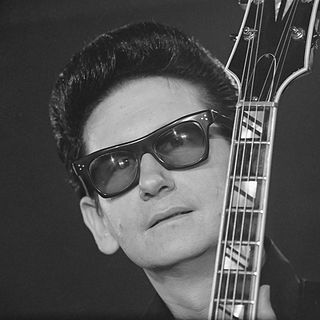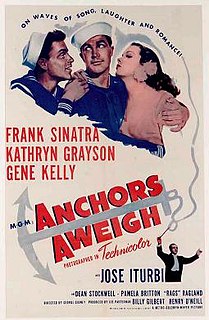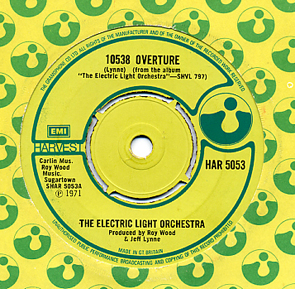
Roy Kelton Orbison was an American singer, songwriter, and musician known for his impassioned singing style, complex song structures, and dark, emotional ballads. His music was described by critics as operatic, earning him the nicknames "the Caruso of Rock" and "the Big O". Many of Orbison's songs conveyed vulnerability at a time when most male rock-and-roll performers chose to project defiant masculinity. He performed while standing motionless and wearing black clothes to match his dyed black hair and dark sunglasses, which he wore to counter his shyness and stage fright.

7th Heaven is a 1927 American silent romantic drama directed by Frank Borzage, and starring Janet Gaynor and Charles Farrell. The film is based upon the 1922 play Seventh Heaven, by Austin Strong and was adapted for the screen by Benjamin Glazer. 7th Heaven was initially released as a standard silent film in May 1927. On September 10, 1927, Fox Film Corporation re-released the film with a synchronized Movietone soundtrack with a musical score and sound effects.

Anchors Aweigh is a 1945 American Technicolor musical comedy film directed by George Sidney and starring Frank Sinatra, Kathryn Grayson, and Gene Kelly, with songs by Jule Styne and Sammy Cahn. In the film, two sailors go on a four-day shore leave in Hollywood, meet a young boy and his aunt, an aspiring young singer, and the sailors try to help her get an audition at Metro-Goldwyn-Mayer. In addition to a live-action Kelly dancing with Jerry Mouse, the cartoon mouse of the Tom and Jerry series, the film also features José Iturbi, Pamela Britton, Dean Stockwell, and Sharon McManus. Tom Cat has a brief cameo appearance as a servant of Jerry Mouse, the lonesome king.

"What'd I Say" is an American rhythm and blues song by Ray Charles, released in 1959. As a single divided into two parts, it was one of the first soul songs. The composition was improvised one evening late in 1958 when Charles, his orchestra, and backup singers had played their entire set list at a show and still had time left; the response from many audiences was so enthusiastic that Charles announced to his producer that he was going to record it.
Mika Nakashima is a Japanese singer and actress. Five of her studio albums, one of her mini-albums and one of her compilation albums have reached number one in Japan's Oricon album chart. She also embarked on an acting career, most notably as Nana Osaki in the live action film adaptations of Nana. She sold 10 million records in Japan.

"Are You Lonesome Tonight?" is a song written by Roy Turk and Lou Handman in 1926. It was recorded several times in 1927—first by Charles Hart, with successful versions by Vaughn De Leath, Henry Burr, and the duet of Jerry Macy and John Ryan. In 1950 the Blue Barron Orchestra version reached the top twenty on the Billboard's Pop Singles chart.
"I Got a Woman" is a song co-written and recorded by American R&B and soul musician Ray Charles. Atlantic Records released the song as a single in December 1954, with "Come Back Baby" as the B-side. Both songs later appeared on the 1957 album Ray Charles.
"Dream", sometimes referred to as "Dream ", is a jazz and pop standard with words and music written by Johnny Mercer in 1944. He originally wrote it as a theme for his radio program. It has been and performed by many artists, with the most popular versions of this song recorded by The Pied Pipers, Frank Sinatra, and Roy Orbison.

The Family Way is a soundtrack recording composed by Paul McCartney, released in January 1967. The album is the soundtrack to the 1966 film The Family Way, directed by Roy Boulting and starring Hayley Mills. Produced and arranged by George Martin, the album was credited to "The George Martin Orchestra" and issued under the full title The Family Way . A 45rpm single, again credited to the George Martin Orchestra, was issued on 23 December 1966, comprising "Love in the Open Air" backed with "Theme from 'The Family Way'", as United Artists UP1165.
"The Three Bells", also known as "The Jimmy Brown Song", "Little Jimmy Brown", or simply "Jimmy Brown", is a song made popular by the Browns in 1959. The single reached number one in the U.S. on Billboard's Hot C&W Sides chart and the Billboard Hot 100 chart. The version by the Browns also hit number ten on Billboard's Hot R&B Sides chart. It was based on French-language song "Les trois cloches" written and composed by Swiss artist Jean Villard Gilles in 1939, who offered it to Édith Piaf in 1945. Piaf did the first recording of this song, with arrangements by Marc Herrand. This version, interpreted by Édith Piaf together with Les Compagnons de la chanson, was a major hit in 1946. The English lyrics were written by Bert Reisfeld and first recorded by the Melody Maids in 1948. The song documents three stages of the life of "Jimmy Brown"—his birth, his marriage, and his death. The Browns' male vocalist, Jim Ed Brown, coincidentally had the same name as the song's character.

"10538 Overture" is the debut single by Electric Light Orchestra (ELO), released in 1972.

"Do Ya" is a song written by Jeff Lynne, that was originally recorded by The Move, which became a hit for the Electric Light Orchestra in 1977.
Anarchic System was a French pop group formed in the early 1970s.

"Carmen Brasilia" is the second single of the Anarchic System, released in 1972 and labeled as "the new popcorn".

Anarchic System is compilation album of the Anarchic System.
This release belongs to a promotional serie by Impact Distributions, featuring both well-known artists and beginners from the AZ records catalog. At least twelve albums shared identical design, with face caption on the front cover, with only variation in background colors.
"Daddy, Mammy, Juddy, Jimmy, Jully and all the family" is a single of the Anarchic System, released in 1976.
Christmas Night with the Stars was a television show broadcast each Christmas night by the BBC from 1958 to 1972. The show was hosted each year by a leading star of BBC TV and featured specially made short seasonal editions of the previous year's most popular BBC sitcoms and light entertainment programs. Most of the variety segments no longer exist in accordance with the BBC's policy of wiping at the time, prevalent into the late 1970s.
"Ma, He's Making Eyes At Me" alternatively sung as "Ma, She's Making Eyes At Me" is a song published in 1921.

"Pretty Paper" is a song written by country music singer-songwriter Willie Nelson in 1963. After being signed to Monument Records, Nelson played the song for producer Fred Foster. Foster pitched the song to Roy Orbison, who turned it into a hit. Nelson recorded his own version of the song in November 1964.











